
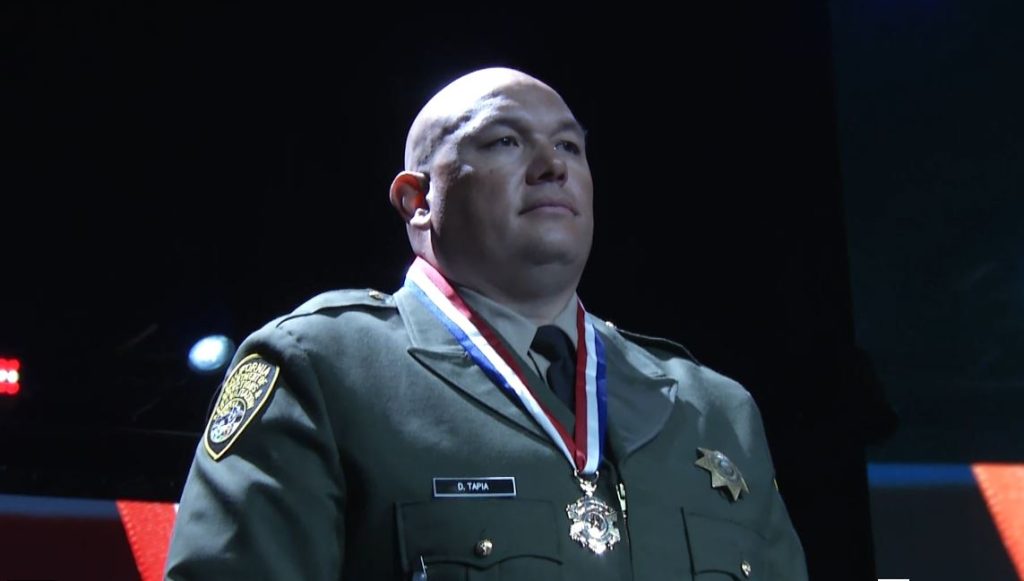
CDCR honors employees at 37th Medal of Valor ceremony
At its 2022 Medal of Valor Ceremony, the California Department of Corrections and Rehabilitation (CDCR) honored 43 people for their bravery in responding to crises and life-threatening situations as well as exemplary work of benefit to the department and the community.
View the complete list of awardees.
“Today’s awards demonstrated the impressive reach CDCR staff honored today have through their courageous acts and an unyielding commitment to making a positive difference in people’s lives,” CDCR Secretary Kathleen Allison said. “Quickly responding to dangerous incidents and even putting their own lives at risk to save others means our communities are safer as a direct result of the dedication, humanity, and valor CDCR staff show day after day.”
One employee was awarded the Medal of Valor, CDCR’s highest award earned by distinguishing themselves by conspicuous bravery or heroism above and beyond the normal demands of correctional service. North Kern State Prison Correctional Officer David Tapia received the Medal of Valor for stopping an attack on a Bakersfield government building and saving lives inside after the assailant set the building on fire.
Employees from nearly all disciplines and professions statewide received awards at Creekside Christian Church of Elk Grove. In addition to the Medal of Valor, CDCR awarded Bronze, Silver and Gold Corrections Stars; Distinguished Service Medals; and medals for Correctional Officer and Supervisor of the Year. CDCR also honored exemplary executives and administrators as well as health care, rehabilitation, parole, and juvenile justice professionals.
What’s New?
COVID-19 testing updates for Headquarters, institutions
Updates were issued this week regarding COVID-19 testing for employees at institutions and Headquarters, regional, and field office locations.
Institutions: Based on updates to existing orders issued by the California Department of Public Health (CDPH), the following changes to staff testing requirements shall be effective September 17, 2022:
- The routine weekly COVID-19 testing for staff who are unvaccinated, partially vaccinated or booster-eligible but did not receive a booster, including those who have an approved religious or reasonable medical accommodation, will be suspended except as specified in the memo. The last day of the weekly testing requirement will be September 16, 2022.
- Pursuant to the updated CDPH order and current federal guidelines, staff who work in the Skilled Nursing Facility of Central California Women’s Facility (CCWF) and are unvaccinated, partially vaccinated or booster-eligible but did not receive a booster, shall continue to comply with routine screening testing. CCWF Hiring Authorities shall use their COVID-19 community transmission level as the trigger for staff testing frequency.
- Staff who become symptomatic while at work or who are identified to be close contacts of a person with COVID-19shall be required to test.
- Hiring Authorities, in consultation with their mission’s Associate Director, Regional Health Care Executive, and Public Health, may implement more stringent testing requirements for staff, regardless of vaccination and accommodation status, in response to COVID-19 outbreaks in the prison and/or medium to high COVID-19 community transmissions.
Non-institutions: Effective September 17, 2022, the California Department of Human Resources will no longer require the following:
- Verification of COVID-19 vaccination status of current and newly-hired staff.
- Weekly COVID-19 testing for staff who report onsite and are unvaccinated, partially vaccinated, or have not provided a record of full COVID-19 vaccination, including those who have an approved religious or reasonable medical accommodation for the COVID-19 vaccination.
- Weekly reporting of COVID-19 testing, vaccination, and absenteeism data.
Children under 2 welcomed back to in-person visiting
Effective immediately, all incarcerated persons residing in a facility which is in OPEN phase of the Roadmap to Reopening are eligible for in-person visitation, regardless of their vaccination status.
Additionally, children under the age of 2 are allowed to visit without a face covering; however, they must undergo a COVID-19 symptom screening the day of the visit. All visitors will no longer need to submit to pre-visit testing regardless of vaccination status; rather, each visitor must self-screen negative for symptoms on the day of the visit. The pre-visit testing for the incarcerated population will no longer be necessary, regardless of vaccination status. If staff observe incarcerated people or visitors displaying symptoms consistent with a contagious disease, the visit may be terminated. If incarcerated persons who are under exposure-related quarantine are asymptomatic and test negative as part of test-to-program plan, they are eligible for in-person visiting. In-person visits are not permitted for those who are housed in isolation.
Facial covering requirements
Effective immediately, facial coverings/masks are optional for everyone entering a CDCR/DJJ institution/facility that is in OPEN Phase (No housing units in Outbreak Phase), and Centers for Disease Control and Prevention (CDC) county transmissibility is low in the secured perimeter’s indoor and outdoor spaces, as well as administrative locations outside the secured perimeter. This does not include isolation, quarantine, sensitive medical areas, medical waiting areas, or transportation.
The use of N95s, KN95s, or procedure masks may be necessary if one or more housing units at the facility are in an OUTBREAK phase. Only the outdoors and administrative areas outside of the secured perimeter would be excluded during an outbreak phase.
Regardless of whether a person has received a vaccination/booster shot or not, all institution and facility visitors and staff must follow the masking guidelines.
Each institution/facility has access to N95 respirators, KN95 masks, and procedure masks, all of which are available upon request. Everyone must always have a mask on them in case they need to enter a place where one is required.
Observations
Suicide Awareness Month spreads hope, awareness, information
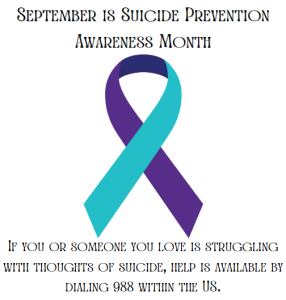
To encourage employees to expand their knowledge and gain new experiences, CDCR/CCHCS GARE Ambassadors are sharing awareness throughout the year. To learn more about the diversity, equity and inclusion efforts visit the GARE website. Submission by GARE Ambassadors Laurenne Davison and Luis Troche.
September is Suicide Prevention Awareness Month. The goal of September is to spread hope and provide awareness and information to those who are affected by suicide. Suicide can affect anyone of any gender, age, or socio-economic status; but it is important to note that suicide is preventable. Suicide is a permanent solution to (often) temporary problems.
Fast Facts
- 1 in 5 adults experience mental illness each year
- 1 in 6 youth (aged 6-17) experience a mental health disorder each year
- Suicide is the 2nd leading cause of death among people aged 10-34
- Annual prevalence of serious thoughts of suicide, by U.S. demographic group:
- 4.8% of all adults
- 11.8% of young adults aged 18-25
- 18.8% of high school students
- 46.8% of lesbian, gay and bisexual high school students
- 4.8% of all adults
- Lesbian, gay and bisexual youth are 4x more likely to attempt suicide than straight youth.
- Transgender adults are nearly 12x more likely to attempt suicide than the general population.
If you are struggling with thoughts of suicide, you are not alone and there is help available now.
As of July 2022, our country transitioned to 988 as the easy-to-remember number to reach the existing National Suicide Prevention Lifeline. The 988 Suicide & Crisis Lifeline is a national network of local crisis centers that provides free and confidential emotional support to people in suicidal crisis or emotional distress 24 hours a day, 7 days a week in the United States.
The links below are provided to assist you with accessing crisis line services and organizations:
- For immediate help: Dial 988 anywhere in the US.
- Veterans Crisis Line
- National Alliance on Mental Illness (NAMI)
- The American Foundation for Suicide Prevention (AFSP)
- Learn about the free and confidential CDCR Wellness App.
Rehabilitation
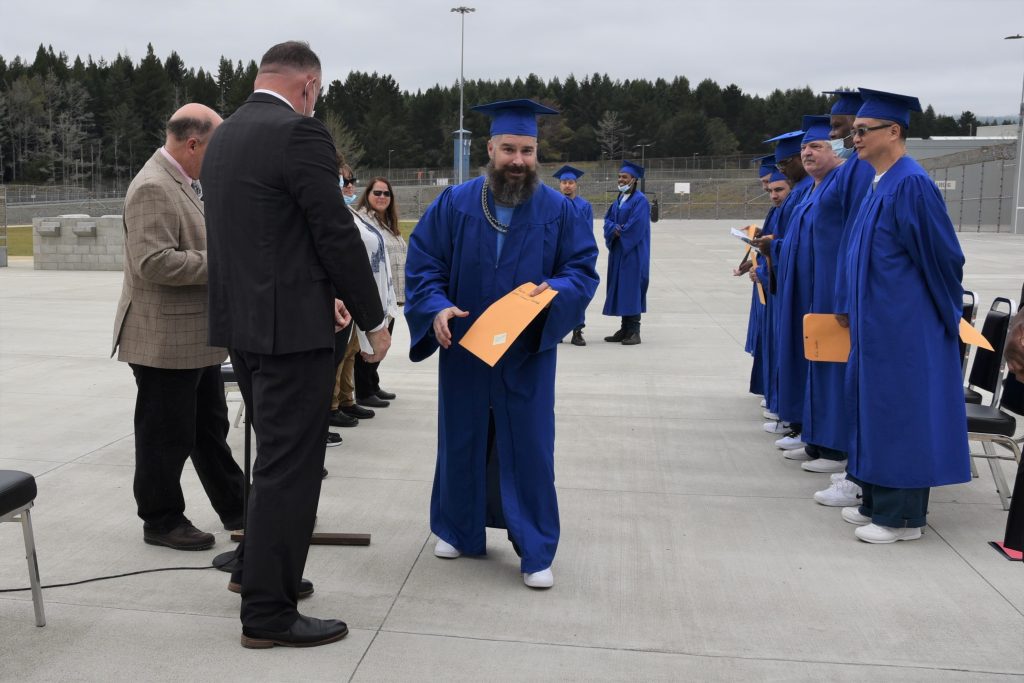
DRP, OCE celebrate successes
Pelican Bay State Prison (PBSP) recently held a graduation ceremony with several graduates attending from D Yard Facility. This is the first graduation at the institution in almost three years.
On September 15, California Institution for Women (CIW) celebrated students’ educational achievements. Superintendent Shannon Swain and representatives from CSULA were in attendance to see 21 students receive their GED, nine students receive an associate’s degree and one student receive her bachelor’s. Great job to all who contributed to the success of the El Prado Adult School Students.
Earlier in September the Division of Rehabilitative Programs (DRP) In-Prison Unit held its first conference since 2019. ALL DRP In-Prison Unit staff were invited, including Office Technicians, Parole Service Associates, Licensed Clinical Social Workers, and Correctional Counselors III and II-Specialists. This was the first time DRP had invited all In-Prison Unit classifications to a conference.
Rehabilitative partners were also invited. In attendance were the executive teams and program directors from Amity Foundation, Center Point Inc., Options Recovery Services and Phoenix House. Special guest speakers were Jeff Macomber, Undersecretary of Operations, Tinamarie Navarro and Al Sasser. Navarro and Sasser are formerly incarcerated individuals who participated in the Offender Mentor Certification Program (OMCP) and became certified mentors. Navarro is the co-owner of Humboldt Addictions Services Program in Crescent City. Sasser works for Options Recovery as the OMCP Assistant Program Director, at California Men’s Colony.
Incarcerated mentors share their journeys

This week’s episode of the “CDCR Unlocked” podcast focuses on three currently incarcerated individuals at Central California Women’s Facility, who are serving as mentors in the Division of Rehabilitative Programs’ Offender Mentor Certification Program. Katherine, Rachel, and Rosa recently took time out of their busy schedules to share with us some of their experiences serving as mentors, and how some of their personal experiences aid them and those they mentor in the program.
(Listen to the CDCR Unlocked episode.)
Our Promise

Celebrating 65 years of caring for California
After a two-year hiatus, a gathering will once again be held at the Capitol to kick off the Our Promise California State Employees Giving at Work campaign! Get inspired to give by visiting more than 100 nonprofit booths at this free and fun event for state employees.
The event takes place from 11 a.m. to 1 p.m. Tuesday, October 4, on the West Steps of the State Capitol, 1315 10th St., Sacramento.
In our Institutions

Women’s Facility Brings Hot Food Vendors To The Yard
At Central California Women’s Facility, the Community Resources Manager (CRM) Courtney Waybright brought food vendors to the Main Yard. A Taco Truck served burritos, french fries and chicken strips while another vendor served Kettle Korn and Funnel Cakes as an inmate fundraiser. “With each food sale, the approval process takes about 90 days for gate clearances, inventory approval, trust withdrawals and confirming the sale items with the vendor. It is important to me to serve hot, fresh food at times to boost sales and appease the population. We completed over 900 total orders in two days. I appreciate the staff support to ensure this sale was a success.”
The food sale boosted over $10,000 in funds raised for charity. Warden Mike Pallares stated “The expectation is all necessary areas collaborate effectively and efficiently to ensure completion. The purpose of the sale is to hold a charitable campaign through the population which not only promotes rehabilitation, but instills a positive correctional presence within the communities we live and serve.
Avenal State Prison helps students through school supply drive
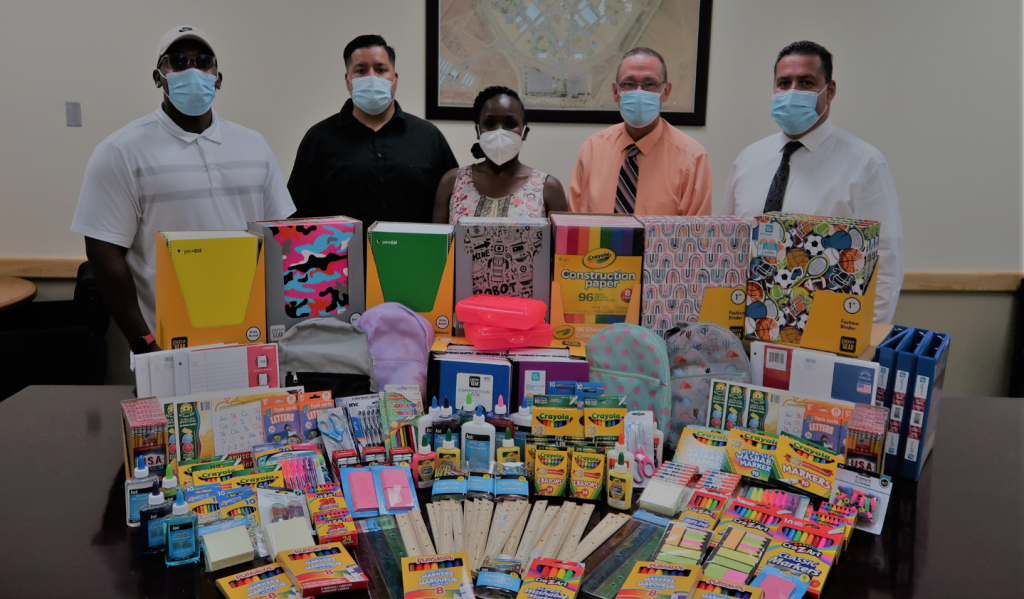
September 15 was a wonderful day for students of Reef-Sunset Unified School District.
Avenal State Prison (ASP) Community Resources Manager Dee Lovette coordinated a Back to School Supplies Donation Drive. Thanks to generous donations from staff, ASP gathered a large amount of school supplies. The donation drive ran for several weeks resulting in a collection of supplies that included crayons, pens, notebooks, pencils, backpacks, construction paper, binders and craft supplies.
Lovette and staff drove to each school and delivered the school supplies to surprised and thankful staff and students.
“Donation drives like this give our staff an opportunity to give back to our community. It is humbling to know we played a small part in giving the children the necessary tools to start their school year,” said Lovette,.
Overwhelmed with the efforts of ASP staff and CRM Lovette, a teacher at Avenal Elementary School shared, “Because of Avenal State Prison’s kindness, we were able to put smiles on many children’s faces. Donation drives like this go a long way in helping our schools.”
“The staff at Avenal State Prison are indeed generous and helpful of the nearby schools,” said Warden Martin Gamboa. “I am particularly thankful to staff who go out of their way to make a drive like this successful.”
Recruitment
CDCR Open House scheduled
CDCR will host an open house from 8:30 a.m. to 5 p.m. Wednesday, September 28, at the Enterprise Information Services (EIS) Birkmont Campus, 1940 Birkmont Drive, Rancho Cordova.
CDCR is currently hiring in all areas! Attendees will learn about the programs and institutions that make CDCR a great place to start a career, speak to current employees about what it’s like to work for CDCR, find out about job vacancies, obtain information about salaries and benefits, and create a CalCareers account and learn to navigate the state civil service process.
EIS will offer same-day testing and interviews for Information Technology Associate and Information Technology Specialist 1 positions. Interviews will be offered to those successful in the examination and meeting the minimum qualifications. Please bring your school transcript.
SATF recruiters share benefits of CDCR careers
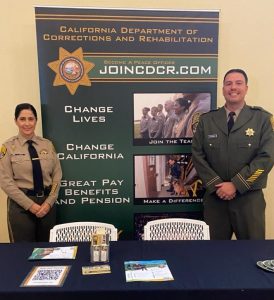
The California Substance Abuse Treatment Facility and State Prison (SATF) Recruitment Team has been working hard throughout the Central Valley. To start the month off, Correctional Lieutenant A. Jones and Correctional Officer E. Morales, both members of the SATF Recruitment Team, attended the Kings County Hanford Job Fair at the Hanford Civic Auditorium in Hanford, CA.
Sergeant P. Gomez, CCI C. Delacruz, and Correctional Officer E. Navarrete, who are also members of the SATF Recruitment Team, attended the 30th Annual Tulare County Job Fair at the Visalia Convention Center in Visalia, CA
SATF Recruitment team members provided possible interested employees with information regarding current vacancies, salary, CalCareer account assistance, and the great benefits CDCR offers. Both events were a great success and the recruiters spoke to a lot of interested candidates at both events.
In the Media
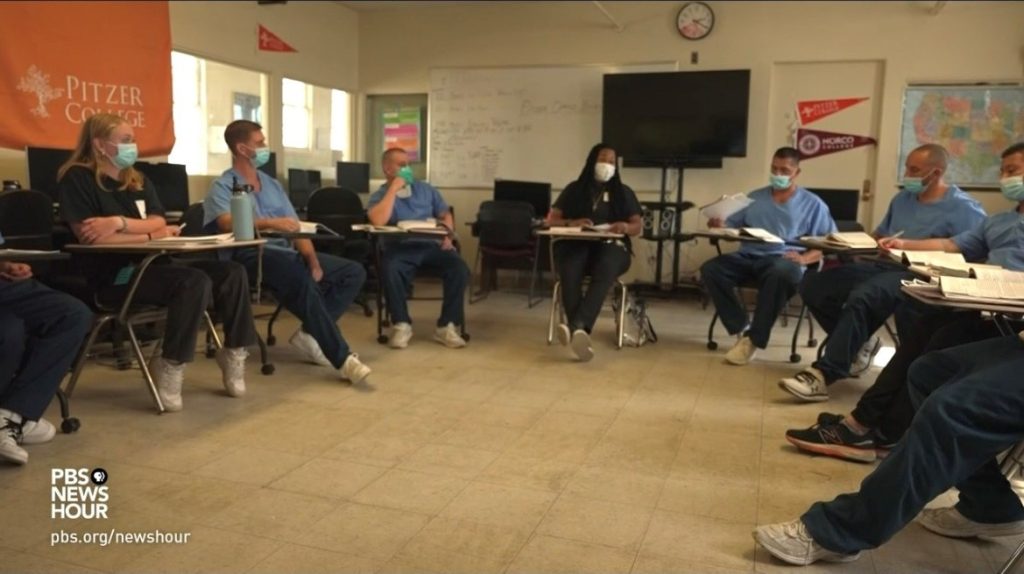
Incarcerated people will soon be eligible for federal grants, opening new educational opportunities
Colleges are gearing up for a spike of interest in prison education programs. That’s because incarcerated people will soon be eligible for Pell Grants. It will be the first time in 28 years prisoners can access that federal funding for higher education.
Pedro Rivera is a senior at Pitzer, a private college in Claremont, California, with a picturesque campus that Rivera has never stepped foot on.
“It’s not easy,” Rivera said. “Like, I put in the work and I obsess over the details and I prepare.”
He’s earning his degree while in a medium-security prison, the California Rehabilitation Center, more than 20 miles away.
Project Rebound at Sacramento State gives formerly incarcerated second chance
More than 122,000 people are incarcerated in California state prisons, according to the Public Policy Institute of California, a nonpartisan research organization.
Of those 122,000 people, the breakdown of people incarcerated is also disproportionate. Data from The Sentencing Project, a research and advocacy center, shows Black people are more than nine times more likely to be incarcerated than white people.
But once incarcerated individuals are released, their sentencing follows them, impacting many areas of their lives.
That’s where the California State University system’s Project Rebound is seeking to help change their lives for the better. The program was expanded to Sacramento State in 2016 and currently has 72 formerly incarcerated students.
Do incarcerated fire crews help clean up forests to prevent wildfires?
This week’s Why Guy question is from Paulette Longa Parsons: “Why doesn’t our government use non-violent criminals to clean up our forest and grasslands to help stop these massive fires?”
Incarcerated fire crews are vital in fighting wildfires in California. As of Sept. 7, there are 56 crews throughout the state staffed for fire response.
Each of the 56 crews has 14 incarcerated people. They are based out of conservation camps, better known as “fire camps” in 25 counties across California. They are at the ready when called to fight fires and when they’re not fighting fires, they are out clearing forests and grasslands.
“These crews are a valuable resource that are utilized year-round to remove fuel to create fuel breaks in and around our communities statewide,” according to Jon Heggie, a spokesman for Cal Fire.
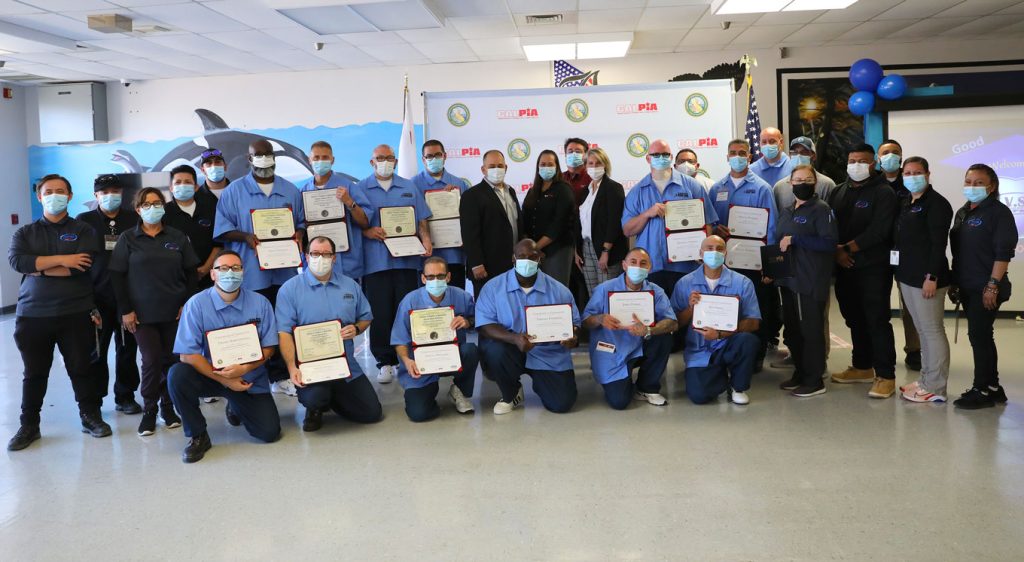
Incarcerated people earn job certifications at Salinas Valley State Prison
Fifteen incarcerated people who participate in the California Prison Industry Authority (CALPIA) received their state-certified apprenticeships and nationally recognized job certifications last Thursday at Salinas Valley State Prison in Soledad.
The incarcerated men graduated from the Healthcare Facilities Maintenance Program, which teaches participants how to clean at a hospital-level. The journey-level certification qualifies incarcerated people for meaningful employment once released.
15 at Salinas Valley State Prison earn state-certificate apprenticeships
The journey-level certification qualifies prisoners for meaningful employment once released.